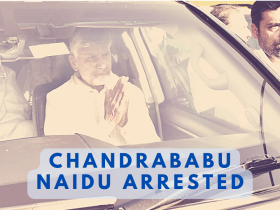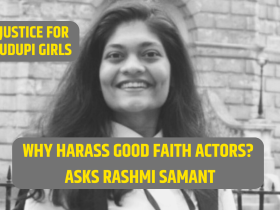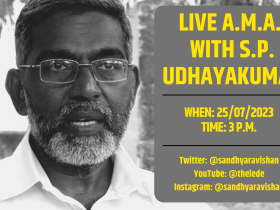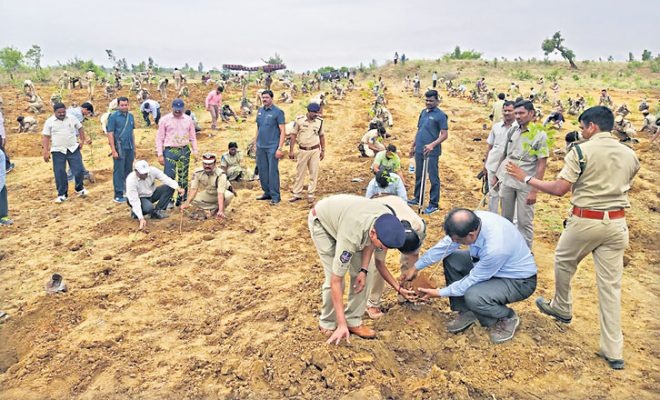There is a silent but ongoing state-sponsored attack on tribals and Dalits in Telangana.
In a three-part ground report, The Lede reveals how the lands of tribals and Dalits in Adilabad district are being indiscriminately snatched away by the Telangana government.
Worse, the state, in the form of its Forest Department, the police and local administration, is unleashing violence and harassment on poor tribals and Dalits who have cultivated their land for over three decades.
It does not seem to matter to the Telangana government that the tribals have land documents and some, even pattas, given to them by the government itself.
“Targets,” we were repeatedly told were more important than the livelihood and liberty of these tribals and Dalits.
Stories of extreme suppression of tribals and Dalits usually emerge only when these communities have been destroyed and broken beyond recognition.
But this is a story of repression and violence, of violation of basic human and land rights, unfolding in front of our very eyes. This is something that can be stopped before it grows bigger and more violent.
In India, there is no greater emotion than land. When this is taken away by force, especially from those with little else, anger brews. This is exactly what The Lede witnessed in all these areas.
And all of this for what? The chief minister’s “prestigious” Kaleshwaram irrigation project requires compensatory afforestation – cut down trees in one part of the state and plant them in another.
In the second part of this series, we tell you how tribals and Dalits are being intimidated & their lands grabbed by the authorities.
Not Just Sarsala
Less than 35 kilometres from the tense village of Sarsala lies another tribal hamlet called Marthadi.
While Sarsala hit the national headlines due to the violence against the woman forest officer C Anita on June 30, the atrocities in Marthadi went unrecorded.
Part 1: Sarsala’s Untold Truth
Sarsala’s cries echo here in this village too. Kolam tribals, Scheduled Tribes, who cultivate small plots of land here, as well as other villagers with pattas – Backward Caste Golas and Scheduled Caste Malas – have lost their lands to the Telangana Forest Department.
This took place about two weeks before the incident at Sarsala. On June 18, a posse of police, Forest Department officials and armed forces descended on an unsuspecting Marthadi.
Athram Bhuvaneshwari, 35, is a tribal whose family has lived in the village for three decades and does podu cultivation over four acres. “I have a ‘hakku pathram’ given by the government,” she says.
“When they came, we sat down on our lands saying we don’t want you to plant saplings, this is our land. But the section officer beat us and dragged us away,” says Bhuvaneshwari.
There are 250 acres under podu cultivation in Marthadi. Unlike Sarsala, these villagers use the land for food – they grow millets, pulses and vegetables here.
The villagers are self-sufficient in terms of food. Now, with their lands grabbed, they are afraid for their future.
“We live off the land,” says Mada Vijaya, 48, who cultivates 4.5 acres of land. “We don’t sell our produce, we don’t cultivate cotton. What do we do for food now?”
Durrem Rajbhai, 37, is aware of the Sarsala incident. “We did not hit anybody like in Sarsala otherwise we too would be in jail,” she says.
“We went to file a case against the forest officials for beating us but the police did not accept the case. We are farmers you see – there will be no case if we are beaten or killed,” she says.
A number of villagers here are beneficiaries of the Rythu Bandhu scheme which provides farmers with Rs 8,000 annually per acre as farm support.
“They used to give us Rs 4000 during Kharif and Rs 4000 during Rabi,” says Mada Vijaya. “But this year that has also stopped coming.”
22 year old Mudsu Sampath says he and other villagers had approached the local ITDA (Integrated Tribal Development Agency) officer to demand that their lands be returned to them.
“The Project Officer said – I am not the concerned officer so don’t ask me,” says Sampath.
Anger is brewing in Marthadi too, over what they view as unfair grabbing of their land by the state.
Radhandi Shankar, 60, and Athram Poshaiah, 65, the former a grey-haired man, slow on his feet, and the latter struggling to walk even with the help of a cane are furious at what has unfolded.
“We fought for our rights over our land when I was 24 years old,” says Radhandi Shankar.
“This man,” he says, pointing to the tottering Poshaiah – “he got into that fight much before me, when he was very young. This is not new to us and we will fight back if necessary,” he warns.
The History Of Bejjur & Koutala
The “fight” referred to by Radhandi Shankar is that of the tribals who waged war against the state along with the Maoist rebels from the late 1960s onwards.
Marthadi village falls within Bejjur mandal of Komaram Bheem district (formerly Adilabad district) of Telangana.
Bejjur lies close to the borders of both Chhattisgarh and Maharashtra, a triangular meeting point of the dense forests of the Dandakaranya.
Since the late 1960s, Bejjur and surrounds have been a prominent haven for Maoists who sought and received support and sympathy from the large tribal population in these areas.
The village of Somini, about 13 kilometres from Bejjur, was one of the first Maoist strongholds in the country, according to locals. In the mid-1970s, police repression of local farmers and tribals, demanding to know who sympathised with the Maoists, led to a wave of support for the armed rebels.
Somini’s villagers went to the Maoists who lived in the forests nearby and told them their woes. The Maoists in turn set up a checkpost, violently engaging with policemen who attempted to cross over.
In nearby Koutala too, a Maoist checkpost was in operation until the mid-1990s, close to the Gadchiroli forests of Maharashtra. Maoists collected tax in lieu for protection from the perceived aggression of the state in the form of the police.
It was Andhra’s Maoists who schooled Chhattisgarh’s tribals in the 1980s on how to organise themselves in their fight for land and identity.
In 2004, YS Rajasekhara Reddy assumed office in erstwhile united Andhra Pradesh. With him came a series of strong-arm tactics by police officers who “infiltrated” villages, lured villagers with gifts and money to turn into “spies” for the police force.
As more and more villagers and tribals came under police influence, small police outposts began to be set up in villages inside the forests.
The hold of the Maoists over this area eventually weakened – many ran back into the forests, fell ill and died. Others surrendered. Many more were killed in “encounters” by the police and CRPF.
Locals, who did not wish to be named for fear of retribution, still speak of the Maoists. “Many times we discuss quietly among ourselves that things would have been different if the Maoists had still been here,” said one villager.
“Especially when we look at such things happening around us – our lands being grabbed by the state that is meant to protect us – we feel that the return of Maoism is not too far off. The younger generation is very angry. The situation is ripe for them to turn to rebellion. I too in my younger years had gone on marches with the Maoists, carrying a gun,” he said.
This sentiment is a running thread across the region. While Maoists may no longer have a stranglehold over the area, they are active in Bejjur and Koutala, according to the locals.
“They come from the forests sometimes and take rest, buy supplies and go back,” said another villager. “They don’t do anything else.”
But support for the Maoists is quite evident. “Our state is taking away our lands. Now what else can we do except fight back in our own way? We are not afraid of fighting. We have done it before,” says a villager.
In fact, as recently as in 2016, Maoists torched a tractor, an excavator and other construction equipment to prevent the Telangana government from building a bridge over the Pranahita river between Gudem and Aheri.
“No Rules Followed”
On March 06, the High Court of Andhra Pradesh delivered a verdict that was meant to protect the poorest land owning farmers and tribals from exactly the sort of aggression that is currently underway in Telangana.
In a PIL filed by tribal rights NGO Samata and retired bureaucrat EAS Sarma, the court upheld the sanctity of the PESA Act – the Panchayat (Extension to the Scheduled Areas) Act, 1996.
The PESA Act clearly states that the Grama Sabha has to be convened and consulted for approval of plans, programs and projects for social development, before any attempts are made to implement them in villages.
No Grama Sabhas had been convened by the Forest Department officials at any of the villages that The Lede visited. Instead, the modus operandi was simply brute force and unwarranted aggression.
Like in Dabba village, a half hour drive from Marthadi. Dabba is home to around 1700 people, one-third of whom belong to the Scheduled Caste Mala community.
These Malas migrated from Maharashtra around four decades ago and have made one part of Dabba their home.
“We came here to Dabba when we were very young,” recollects Ram Tenki Tukaram, 60, who lost five acres of land to the Forest Department. “The villagers allowed us to cultivate these lands and we have been doing so for generations.”
In Dabba too, there are no markings or fences to show what part of the land belongs to the Forest Department and what parts are revenue land.
The lands cultivated by the Dalits are interspersed with patta lands of other farmers.
Some of the lands claimed by the Dalits are also surrounded by patta lands, making it next to impossible to identify which lands come under the Reserved Forest category.
“The Forest Department officials have been taking money from us every year and letting us cultivate. They have not objected to us cultivating this land for the past 40 years. What has happened now?” he asks, furious.
Tukaram and another old man, Durgam Bapu, 70, say that in the first week of June, four buses brimming with police and CRPF arrived in their part of Dabba village.
“They did not allow us to come anywhere near our land,” said Bapu. “They kept saying – it is our land, we are taking it, now get lost.”
Tukaram says both Bapu and he went with folded hands to the officials and touched their feet. “We told them – sir, we are both old men. What will we do? I will fall at your feet.
We then held the feet of the Rangers and other officers. But they kicked us away saying, lanjakoduka (ba***rd), what do you think. We said – we have been cultivating here for 35 years sir, we are very upset sir. We are poor people sir. They abused us even further, calling us ba***rds.”
None of the families here own the land that they cultivate – there are no pattas to be seen.
In 2014, KCR came to power on the promise of three acres of land for Dalits in the state. This too has not materialised for the residents of Dabba.
Jumdi Devaji is visibly upset. He has six young daughters and is worried sick about how he will feed them now.
“I used to cultivate five acres of land here with cotton and tur,” he says. “Each of us has taken Rs 50,000 to Rs 60,000 as loan to plant the cotton crop. The banks don’t lend to us so we are forced to take from private moneylenders. Now all of my crops are gone. How will I feed my daughters?” he asks.
“They have to do compensatory afforestation for the Kaleshwaram project, we understand that much,” said Abdul Mazhar, son of the Sarpanch of Dabba village.
“But our constituency does not get one drop of water from Kaleshwaram. During YSR’s time, the STs got ‘hakku pathram’. If SCs also get land, they can go about their lives.
These people have been cultivating land here for 40 years. Today, the Forest Department, which did not ask any questions for 40 years, has suddenly done this. That too, after cultivation of crops – bringing 30-40 families to the streets,” he says, livid.
“During the election campaign, KCR said that after he becomes CM, he will come personally to our Sirpur constituency, that he will set up camp and give farmers their ‘hakku pathram’. That same man is now grabbing the lands of Dalits,” he charges.
The Scheduled Tribes and Other Traditional Forest Dwellers (Recognition of Forest Rights) Act came into force on 29 December 2006.
Until then the tribals living in forest areas for generations were viewed as encroachers. With the passing of this Act, they were, rightly, viewed as dwellers and protectors of the forests.
This landmark legislation protects the rights of Scheduled Tribes to live in, gather forest produce and cultivate land inside forests which they had traditionally made their home.
The Act also protects the rights of “other traditional forest dwellers” and defines them clearly – “any member or community who has for at least three generations prior to the 13th day of December, 2005 primarily resided in and who depend on the forest or forests land for bona fide livelihood needs.”
The Scheduled Caste Malas of Dabba village would fit well into this category.
MLA of Sirpur constituency, Koneru Konappa told The Lede that he would take these issues to the leadership for a logical resolution.
“The tribals and other people in my constituency are suffering and I will take this issue to the notice of our chief minister. I am confident that he will resolve this issue quickly,” said Konappa.
Speaking to The Lede over phone from Hyderabad, Forest Minister of Telangana Allola Indrakaran Reddy said – “No one has brought this to my notice. I have no idea about this.” When asked whether he would conduct an inquiry, the minister reiterated – “I have no idea about this issue.”
Unrest wafts like a dank breeze over Komaram Bheem district of Telangana. Land, livelihood and social status are interlinked. Loss of one means the loss of all three.
And patience, amongst the tribals and Dalits of these areas is wearing thin.









Leave a Reply